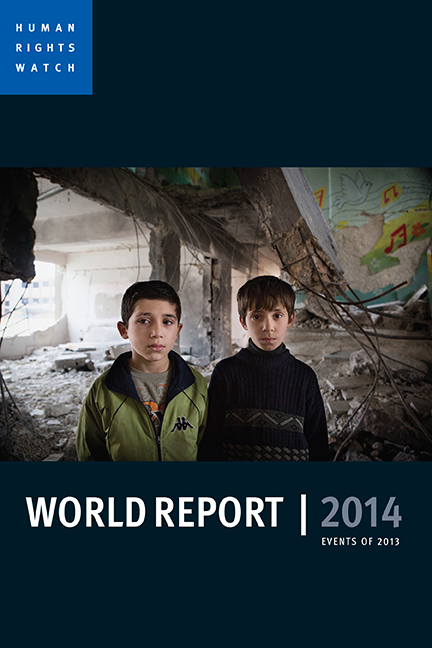Book contents
- Frontmatter
- Dedication
- HUMAN RIGHTS WATCH
- Table of Contents
- Foreword
- Rights Struggles of 2013: Stopping Mass Atrocities, Majority Bullying, and Abusive Counterterrorism
- The Human Rights Case for Drug Reform How Drug Criminalization Destroys Lives, Feeds Abuses, and Subverts the Rule of Law
- Putting Development to Rights: Integrating Rights into a Post-2015 Agenda
- The Right Whose Time Has Come (Again) Privacy in the Age of Surveillance
- Photo Essays
- AFRICA
- AMERICAS
- ASIA
- EUROPE AND CENTRAL ASIA
- MIDDLE EAST AND NORTH AFRICA
- UNITED STATES AND CANADA
- 2013 HUMAN RIGHTS WATCH PUBLICATIONS
- Acknowledgments
- Frontmatter
- Dedication
- HUMAN RIGHTS WATCH
- Table of Contents
- Foreword
- Rights Struggles of 2013: Stopping Mass Atrocities, Majority Bullying, and Abusive Counterterrorism
- The Human Rights Case for Drug Reform How Drug Criminalization Destroys Lives, Feeds Abuses, and Subverts the Rule of Law
- Putting Development to Rights: Integrating Rights into a Post-2015 Agenda
- The Right Whose Time Has Come (Again) Privacy in the Age of Surveillance
- Photo Essays
- AFRICA
- AMERICAS
- ASIA
- EUROPE AND CENTRAL ASIA
- MIDDLE EAST AND NORTH AFRICA
- UNITED STATES AND CANADA
- 2013 HUMAN RIGHTS WATCH PUBLICATIONS
- Acknowledgments
Summary
World Report 2014 is Human Rights Watch's 24th annual review of human rights practices around the globe. It summarizes key human rights issues in more than 90 countries and territories worldwide, drawing on events from the end of 2012 through November 2013.
The book is divided into three main parts: an essay section, photo essays, and country-specific chapters.
Reflecting on the “Rights Struggles of 2013,” Executive Director Kenneth Roth highlights three main themes. In Syria, the slaughter of civilians continued with only a weak international response, straining the “Responsibility to Protect,” or R2P, doctrine, which commits world governments to respond to imminent or ongoing mass atrocities. Elsewhere, governments are engaged in what Roth calls “abusive majoritarianism”—expressing outward commitment to democracy while in reality using the real or perceived preferences of the majority to limit dissent and suppress minorities. And in the United States, new disclosures about the use of dragnet surveillance and targeted drone killings have fueled debate about the tactics of counterterrorism. But Roth sees encouraging signs. The R2P doctrine appears to be holding up enough to provide at least some help in several African countries facing mass atrocities, including the Central African Republic, South Sudan, and the Democratic Republic of Congo; public reaction has been strong against what Roth calls “feigned democracy”; and the US government faces increased pressure to change current counterterrorism practices. In addition, he notes improvements in the machinery that helps to defend human rights, including the United Nations Human Rights Council. The year 2013, he concludes, may have had “more than enough suffering,” but it also featured a “vigorous movement fighting back.”
Next, Maria McFarland Sánchez-Moreno charts Human Rights Watch's evolving approach to current global policies aimed at curbing drug use and the multi-billion dollar illegal drug trade (“The Human Rights Case for Drug Reform”). For many years, Human Rights Watch documented widespread abuses that governments committed in the name of combatting drugs. But research in several countries led us to the increasing conviction that, when it came to personal use and possession of drugs, the criminalization of drugs was not only ineffective and corrosive of institutions, but also inconsistent with personal autonomy and the right to privacy.
- Type
- Chapter
- Information
- World Report 2014Events of 2013, pp. viii - xPublisher: Bristol University PressPrint publication year: 2014



